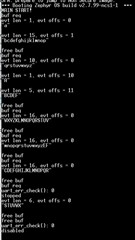Hi, hello_world_UART_rx_test.zip
I am trying to use the UART on my nRF9160DK board.
In my program I have 2 uarts in use. uart0 is used for printk output and uart1 is used to receive data in async mode.
I have both connected to the vcom ports on the dev kit (the "usb" port) and have 2 instances of tera term open on windows; one for the printk output, one for the chars i want to send.
Now the problem:
when sending single chars, everything is ok, but if I send a sequence of chars, that would overflow the buffer i have given the uart_rx_enable() or the uart_rx_buf_rsp() function ( eg pasting "abcdef" into the "uart1" terminal when there are already a few bytes in the buffer), I get the free and the request buffer events. after that, I get another rx event.
lets say the buffer is pretty full and I send "abcdef". Then "abc" still fits into the first buffer, I get the rx event for 3 bytes of data. everything ok. free event and request buffer event follow, new buffer is given. Then I immediately get the rx event with the new buffer. in the new buffer is "def", and I get offset=0 (which is ok), but len=1 (which is NOT ok) from the evt parameter in the callback function -> I am not getting notified for the 'e' and 'f' !!
When I send a single new char now, it gets placed after the "def", so on an offset of 3, but in the evt parameter it says offset of 1 (because it ignored the 'e' and 'f' before).
I am surely using the functionality wrong. please take a look at the attached FW, because can't figure out what I am doing wrong from documentation alone.
Thank you!


